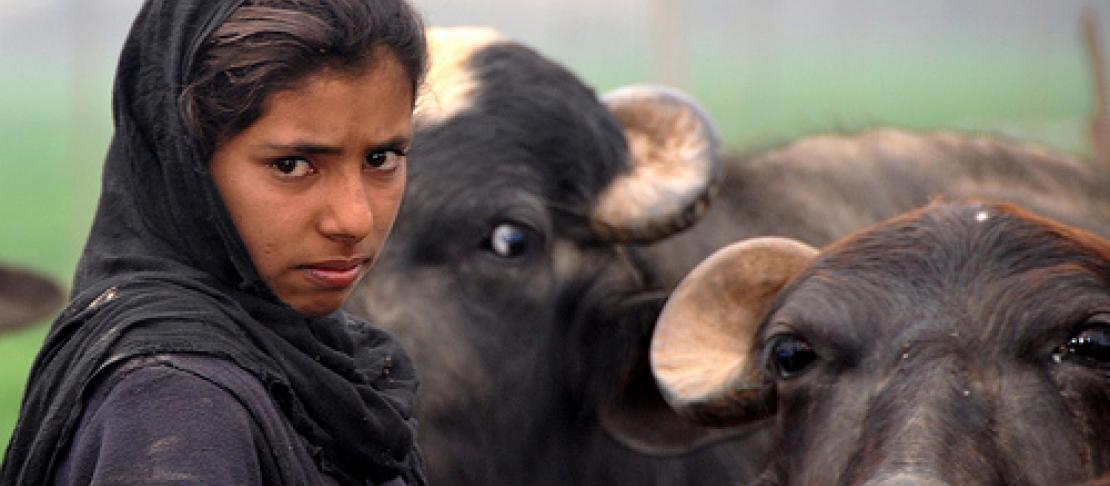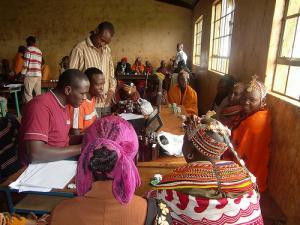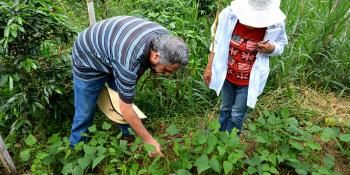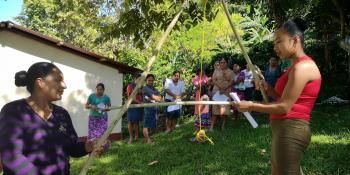Index-based insurance arms farmers against uncertainty

by Cecilia Schubert
Without the ability to take risks, a farmer might not invest in new seeds and activities that could increase yields, but prefer to stay ‘safe’ and consequently underperform year after year. Having an insurance contract could enable farmers to try new types of seeds, innovative production technologies and invest in new livestock breeds, according to Professor Michael Carter from the University of California-Davis, and this could improve livelihoods and food security in the household and community.
Dr. Carter gave an in-depth presentation at the latest live streamed science seminar held by the CGIAR Research Program on Climate Change, Agriculture and Food Security (CCAFS). He discussed how index-based insurance is moving forward as a viable policy alternative to insure farmers against risks, and shared research into the role and potential of index insurance in rural development.
Carter’s premise is that index based insurance could be an alternative way to craft a new ending to the “same old story,” where poor are stuck in poverty due to lack of financial assets and exposure to climatic disasters such as floods, droughts, and pests and diseases. Overcoming the poverty trap, where people can’t move forward unless they own collateral or have loan opportunities, is important for economic and social development. In order for the system to become a viable option, Carter believes there is a need to think more strategically about uninsured risk, and how people respond to risks and insurance solutions.
Index insurance systems are not new however, but are still very much in the initial stages in developing countries. An index based livestock insurance (IBLI) project in Kenya covers livestock losses in the Marsabit district, initiated by the International Livestock Research Institute and BASIS Research Program within University of California-Davis among others. It bases assumptions on losses from satellite images and on-the-ground verification data. The project has even administered cash transfers  to insured livestock owners that lost cattle during the latest drought spell. This pilot project benefits from the fact that high percentage of losses in livestock is highly correlated and can be predicted very well, Michael explained. The hope is that the project will help create overall development in the area, since farmers could now reinvest in new livestock. For pastoralists this means that prices for goats and cows don’t have to plummet during drought spells when many are simultaneously trying to sell off their animals. How, and if, index based insurance will play into development improvements still needs more research and follow-ups.
to insured livestock owners that lost cattle during the latest drought spell. This pilot project benefits from the fact that high percentage of losses in livestock is highly correlated and can be predicted very well, Michael explained. The hope is that the project will help create overall development in the area, since farmers could now reinvest in new livestock. For pastoralists this means that prices for goats and cows don’t have to plummet during drought spells when many are simultaneously trying to sell off their animals. How, and if, index based insurance will play into development improvements still needs more research and follow-ups.
Learn more about the Marsabit pilot insurance project by downloading the project summary.
According to Carter, one of the greater challenges facing index insurance will be scaling up these successful projects. The prepared pilot project insurance contracts have been made specifically for those contexts. When it comes to scaling up, Michael said, the CGIAR will play an important role. Scaling up will require high-level analytical skills and data management and system engineering. Projects that appear to have successful contracts and high level of trustworthiness should be further developed. The idea is to scale up and create projects that don’t require hand-made contracts but can function on more general deals to minimize transaction costs and efficiency.
The system has the potential in assisting farmers when taking more risks, and with that, potentially improve yield outputs. But when farmers are living on the edge of poverty, sometimes on 20-30 cents a day as in parts of Kenya, how are they convinced that this is a viable option? This is the difficult part with insurance - you pay for something that you hope never to have to use. There is also limited understanding of how different people manage risks under various circumstances, Michael emphasised. How people can be convinced that insurance will benefit them in the long term will be challenging. One way that this is done is through showcasing various insurance contracts and impacts it might have through games and other communication technologies to people, to show how insurance works.
Carter also discussed the need to further include gender analysis in the climate risk area, i.e. how can insurance contracts be crafted to specifically target vulnerable populations, especially women’s, needs better. This is an important factor seeing as men and women face different options and challenges in relation to climate change. Including a gender analysis could make sure that the offered insurance contract is relevant for both male and female farmers depending on their roles and responsibilities in the household and community. Read more about gender in the context of climate change and agriculture.
Read more:
- View our research projects on managing climate risks,
- Look through our blog posts that cover index-based insurance,
- Read more about a rainfall index insurance project in Ethiopia.
Next live streamed science seminar: 7 November, 2012 at 14:30 (CET)
CCAFS upcoming science seminar will cover the theme Mitigation potentials in the livestock sector, by Dr. Mario Herrero from the International Livestock Research Institute (ILRI).
This blog post was written by Cecilia Schubert, Communications Assistant at the CGIAR Research Program on Climate Change, Agriculture and Food Security (CCAFS). To get notified when our next science seminar is, follow us on Facebook, and Twitter @Cgiarclimate. You can also sign up to our science seminar e-mailing list here.


